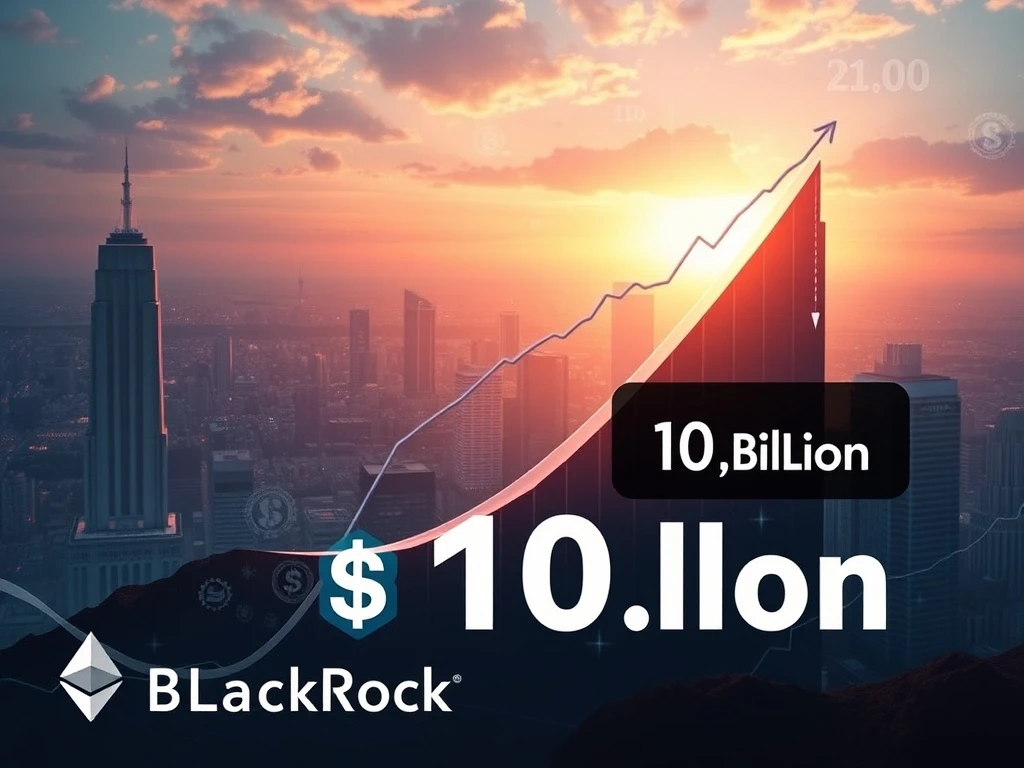Ethereum ETF: BlackRock’s ETHA Achieves Astonishing $10B Milestone, Reshaping Crypto Investment

The world of finance is witnessing a seismic shift, and at the heart of it lies the burgeoning integration of cryptocurrencies into traditional investment vehicles. A recent monumental achievement by BlackRock’s iShares Ethereum Trust (ETHA) has sent ripples across the entire crypto market, signaling a new era of mainstream adoption. Imagine an investment product growing so fast it outpaces nearly every other ETF in history – that’s precisely what ETHA has accomplished, solidifying the immense potential of the Ethereum ETF.
BlackRock ETHA’s Phenomenal Ascent: A New Benchmark for Digital Assets
In a move that underscores the growing appetite for regulated crypto exposure, BlackRock’s iShares Ethereum Trust (ETHA) has shattered expectations, amassing an astounding $10 billion in assets under management (AUM) in a mere 251 days since its launch in early 2024. This isn’t just a win for BlackRock; it’s a significant milestone for the entire digital assets space. To put this into perspective, ETHA has become the third-fastest exchange-traded fund (ETF) in U.S. history to reach this valuation, trailing only behind two Bitcoin-focused giants: the iShares Bitcoin Trust (IBIT) and Fidelity’s Wise Origin Bitcoin Fund (FBTC).
The speed of this growth is nothing short of remarkable. The surge from $5 billion to $10 billion occurred in a blistering 10 days. Bloomberg ETF analyst Eric Balchunas aptly described this pace as “the ETF equivalent of a God candle,” a term typically used in crypto to denote an enormous, rapid price increase. This unprecedented inflow momentum highlights the strong demand for a regulated Ethereum ETF product, especially one backed by a financial powerhouse like BlackRock.
Why are Ethereum ETFs Attracting So Much Institutional Investment?
The impressive performance of ETHA isn’t an isolated event; it reflects a broader trend of shifting investor preferences within the crypto landscape. While Bitcoin ETFs initially dominated early 2025 with an impressive 12-day inflow streak, Ethereum ETFs have since begun to outpace their Bitcoin counterparts. Recent data shows Ethereum ETFs recording a staggering $4.7 billion in monthly inflows, with a single day (July 17) witnessing $602 million in net inflows for Ethereum ETFs, surpassing Bitcoin ETFs’ $523 million on the same day.
Several factors contribute to this growing wave of institutional investment into Ethereum products:
- Ethereum’s Utility and Ecosystem: Unlike Bitcoin, which is primarily seen as ‘digital gold’ or a store of value, Ethereum boasts a vast ecosystem. Its proof-of-stake architecture powers decentralized finance (DeFi), non-fungible tokens (NFTs), and a multitude of decentralized applications (dApps). This utility is increasingly viewed by institutions as a significant long-term value driver.
- Yield Potential through Staking: BlackRock’s application to enable staking within ETHA, pending regulatory clarity, is a game-changer. Staking allows investors to earn rewards by locking up their Ethereum holdings to support the network’s operations. A recent SEC ruling classifying staking rewards as income rather than securities has paved the way for such innovations, potentially unlocking new avenues for yield generation and attracting more institutional capital.
- Diversification Beyond Bitcoin: As the crypto market matures, institutional investors are looking for ways to diversify their digital asset portfolios beyond just Bitcoin. Ethereum, as the second-largest cryptocurrency by market capitalization and a foundational blockchain for many innovations, offers a compelling alternative.
The Power of BlackRock in the Crypto Market
The influence of BlackRock, the world’s largest asset manager, cannot be overstated. Their entry into the crypto space, first with Bitcoin and now with the Ethereum ETF, has lent immense credibility and legitimacy to the entire sector. BlackRock’s ETHA, with its competitive 0.25% fee structure, has benefited significantly from the firm’s market credibility, extensive distribution network, and established relationships with institutional clients. This trust factor is crucial for bringing traditional finance players into the volatile yet promising world of digital assets.
The rapid approval and adoption of ETHA—launched alongside seven other spot Ethereum ETFs after SEC clearance—further highlight the maturing regulatory and market infrastructure for digital assets. This regulatory embrace, however cautious, is a strong signal to the market that cryptocurrencies are here to stay and are increasingly becoming a part of mainstream financial portfolios.
Navigating the Digital Assets Landscape: Bitcoin vs. Ethereum ETFs
While ETHA’s 251-day timeline to $10 billion is remarkable, it’s important to acknowledge the even faster pace set by Bitcoin ETFs, which hit the same milestone in just 34 days. JPMorgan’s Nasdaq Equity Premium Income ETF (JEPQ), the fourth-fastest ETF to hit $10 billion, took 444 days, further underscoring the accelerated growth of crypto ETFs compared to traditional ones.
The contrast between Bitcoin’s explosive growth and Ethereum’s more gradual but steady ascent reflects divergent investor perceptions. Bitcoin remains the anchor of the crypto market, often seen as a hedge against inflation or a long-term store of value. Ethereum, on the other hand, with its focus on innovation, smart contracts, and yield generation, attracts a growing segment of institutional investment looking for growth opportunities and active participation in the decentralized economy.
This dynamic suggests a maturing market where investors are increasingly differentiating between various digital assets based on their unique value propositions. The success of both Bitcoin and Ethereum ETFs indicates a broadening investment thesis within the digital asset class, moving beyond just a single dominant cryptocurrency.
Beyond the Numbers: Broader Implications for the Crypto Market
The success of ETHA adds to a compelling narrative of crypto’s integration into mainstream finance. With Ethereum ETFs now serving as critical conduits for institutional investment, the sector’s growth is likely to remain closely tied to broader market dynamics and continued regulatory evolution. As of mid-2025, Ethereum ETFs have outperformed Bitcoin ETFs in recent inflow metrics, signaling a potential shift in investor sentiment toward altcoins with clear utility and yield potential.
This increased accessibility through ETFs means that a wider range of investors, including those who were previously hesitant due to the complexities of direct crypto ownership, can now gain exposure to Ethereum. This institutional stamp of approval can lead to greater liquidity, reduced volatility over time, and a more stable growth trajectory for the entire digital assets ecosystem.
Challenges and the Road Ahead for Institutional Investment in Crypto
Despite the current wave of optimism, the path forward for crypto ETFs is not without its challenges. Regulatory scrutiny remains a constant factor, and while progress has been made, further clarity on various aspects of digital asset regulation is still needed. Price volatility, inherent to the crypto market, could also temper future momentum, particularly as the market navigates the delicate balance between innovation and oversight.
However, the momentum is undeniable. The success of the Ethereum ETF, spearheaded by giants like BlackRock, marks a pivotal moment. It signifies that major financial institutions are not just observing but actively participating in shaping the future of finance, with cryptocurrencies playing an increasingly central role.
Conclusion: A New Dawn for Digital Assets
BlackRock’s ETHA reaching $10 billion in record time is more than just an impressive financial statistic; it’s a testament to the evolving landscape of institutional investment in the crypto space. It underscores the growing maturity of the crypto market and the increasing confidence among traditional finance players in the long-term viability and potential of digital assets like Ethereum. As these products continue to gain traction, they will undoubtedly pave the way for further innovation and integration, making cryptocurrencies an undeniable force in global finance. The journey of the Ethereum ETF is just beginning, and its trajectory promises to be one of the most exciting stories in modern investment.
Frequently Asked Questions (FAQs)
What is an Ethereum ETF?
An Ethereum Exchange-Traded Fund (ETF) is an investment vehicle that allows investors to gain exposure to the price movements of Ethereum without directly owning the cryptocurrency. These ETFs typically hold actual Ethereum, and their shares trade on traditional stock exchanges, making it easier for conventional investors and institutions to access the asset.
Why is BlackRock’s ETHA significant?
BlackRock’s iShares Ethereum Trust (ETHA) is significant because it’s one of the first spot Ethereum ETFs launched in the U.S. and has achieved $10 billion in AUM in a remarkably short period (251 days), becoming the third-fastest ETF in U.S. history to do so. Its success highlights strong institutional demand and BlackRock’s influence in legitimizing crypto investments.
How does ETHA compare to Bitcoin ETFs in terms of growth?
While ETHA’s growth to $10 billion in 251 days is exceptional, it still trails the fastest Bitcoin ETFs (like BlackRock’s IBIT), which reached the same milestone in just 34 days. However, Ethereum ETFs have recently seen higher monthly and daily inflows compared to Bitcoin ETFs, indicating a growing interest in Ethereum’s unique utility and ecosystem.
What is the role of staking in Ethereum ETFs?
Staking in Ethereum ETFs would allow the fund to earn rewards by participating in Ethereum’s proof-of-stake network. This could provide an additional yield for investors, making the ETF even more attractive. BlackRock has applied to enable staking for ETHA, following an SEC ruling that clarified staking rewards as income, potentially unlocking new avenues for institutional capital.
What are the future prospects for crypto ETFs?
The success of both Bitcoin and Ethereum ETFs suggests a bright future for crypto ETFs. They are seen as crucial conduits for institutional investment, offering regulated and accessible ways to gain exposure to digital assets. Continued regulatory clarity and increasing investor education are expected to drive further growth and potentially lead to the introduction of ETFs for other major cryptocurrencies.










